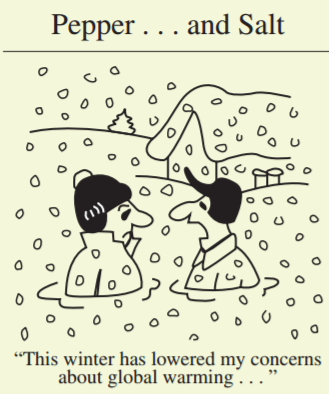Unit 3- The Chemistry of Global Climate Change
Question 1
Understanding Earth’s energy balance is essential to understanding the issue of global warming. For example, the solar energy striking Earth’s surface averages 168 watts per square meter (W/m²), but energy leaving the Earth’s surface averages 390 W/m². Why isn’t the Earth cooling rapidly?
Considering the difference the Solar energy that strikes the Earth and the larger amount that is reflected, the temperature of the earth should be -18°C. However, because of various forcings, such as greenhouse gases and clouds, the temperature of the earth averages 16°C instead.
When solar radiation travels to the Earth, 29% of the radiation is reflected into space, after which, greenhouse gases in the atmosphere absorb 23% of what’s left. The rest of the 48% radiation is absorbed by the surface. After time, the surface of the Earth emits the radiation back into space. However, not all of the radiation is reflected back into space, again, greenhouse gases in the atmosphere (such as H2O and CO2) absorb some of what is reflected by the surface. Because of this, the greenhouse gases help to trap sufficient heat for the Earth to maintain a warmer average temperature.
https://www.nasa.gov/pdf/135642main_balance_trifold21.pdf
http://earthobservatory.nasa.gov/Features/EnergyBalance/page4.php
Question 2
Decide and explain whether the statement is correct or incorrect.
This statement is incorrect. Earth is not cooling down when winter is occurring. Winter is a season, and referred to as weather instead of climate. Climate and weather differ in terms of the time period. To understand the effects of global warming, meteorologists study the climate on earth instead of weather as climate refers to weather patterns over a long period of time and its statistics are more reliable while weather is over a short period of time and is unreliable. Furthermore, global warming does cause extreme weather events such as extreme winters and summers. The cartoon may be depicting a scene of extreme winter caused by the effects of global warming.
Question 3
One of the first radar devices developed during World War II used microwave radiation of a specific wave range that triggers the rotation of water molecules. Why was the design not successful?
It was not successful because detection will fail due absorption of microwave by water. The microwave radiation will also result in the heating up of air around the radar resulting in sickness of the engineers of the radar.
Question 4
Now that you have studied air quality (Unit 1), stratospheric ozone depletion (Unit 2), and global warming (Unit 3), which do you believe poses the most serious problem for you in the short run (pick one and explain)? In the long run (pick one and explain why)?
Air quality poses as the most serious problem in the short term as it can be easily be affected in a short period of time. Short term health effects will also arise such as eye irritation, breathing difficulties etc. Over the long term, global warming poses the most serious problems. While the hole in the ozone layer will cause harmful radiation to leak, we should be able to pull through with sunblock. If the sea level continues to rise uncontrollably however, there is not much we can do about it and civilization in many parts of the world will be destroyed.
